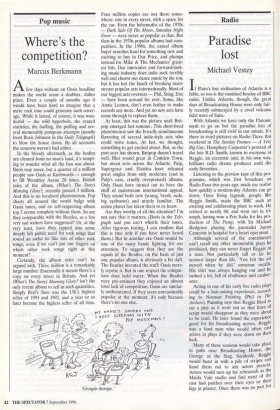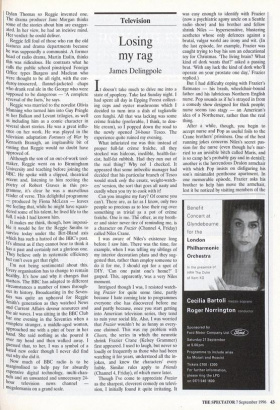Radio
Paradise lost
Michael Vestey
If Plato's lost civilisation of Atlantis is a fable, so too is the vanished heyday of BBC radio. Unlike Atlantis, though, the great days of Broadcasting House were only fair- ly recently submerged by a cruel volcanic tidal wave of Suits.
With Atlantis we have only the Platonic myth to go on but the paradise lost of broadcasting is still vivid in our minds. It's there in word pictures on Radio Three this weekend in The Sunday Feature — A Very Big Guy, Humphrey Carpenter's portrait of the late R.D. Smith, known to everyone as Reggie, an eccentric and, in his own way, brilliant radio drama producer until the early Seventies.
Listening to the preview tape of this pro- gramme, which was first broadcast on Radio Four two years ago, made me realise how quickly a modern-day Atlantis can go down. Once living legends, people like Reggie Smith, made the BBC such an exciting and exhilarating place to work. He retired at nearly 60, and went out in tri- umph, having won a Prix Italia for his pro- duction of The Pump, with Sir Michael Redgrave playing the journalist James Cameron in hospital for a heart operation.
Although several of the contributors can't recall any other memorable plays he produced, they can never forget Reggie as a man. Not particularly tall or fat he seemed larger than life. 'You felt the air moved when he did,' someone recalls. His shirt was always hanging out and he rushed a lot, full of ebullience and exuber- ance.
Acting in one of his early live radio plays could be a hair-raising experience, accord- ing to Norman Painting (Phil in The Archers). Painting says that Reggie liked to cut a play as it went out so that lines of script would disappear as they were about to be read. He later found the experience good for his broadcasting nerves. Reggie was a kind man who would often cast actors in plays if they were down on their luck.
Many of these sessions would take place in pubs near Broadcasting House, the George or the Stag. Suddenly, Reggie would burst in with a pile of scripts and hand them out to any actors present. Actors would turn up for rehearsals at the Maida Vale studio and find most of the cast had patches over their eyes or their legs in plaster. Once there was no part for
Dylan Thomas so Reggie invented one. The drama producer Jane Morgan thinks some of the stories about him are exagger- ated. In her view, he had an incisive mind. Her verdict: he could deliver.
Reggie fell foul of those who ran the old features and drama departments because he was supposedly a communist. A former head of radio drama, Martin Esslin, thinks this was ridiculous. He contrasts what he calls the public school pinstriped Foreign Office types Burgess and Maclean who were thought to be all right, with the cor- duroy-trousered, flannel-jacketed chaps who drank real ale in the George who were supposed to be dangerous — 'A complete reversal of the facts,' he says.
Reggie was married to the novelist Olivia Manning who turned him into Guy Pringle in her Balkan and Levant trilogies, as well as including him as a comic character in several short stories. He was a great influ- ence on her work. He was played in the television adaptation Fortunes of War by Kenneth Branagh, an implausible bit of casting that Reggie would no doubt have approved of.
Although the son of an out-of-work tool- maker, Reggie went on to Birmingham University and teaching before joining the BBC. He spoke with a clipped, theatrical accent and, listening to him reciting the poetry of Robert Graves in this pro- gramme, it's clear he was a marvellous reader of verse. This delightful programme — produced by Fiona McLean — leaves me feeling that, while he might have squan- dered some of his talent, he lived life to the full. I wish I had known him.
It makes me think, though, how impossi- ble it would be for the Reggie Smiths to survive today under the Birt-Bland axis which has such a hatred of the BBC's past. It's almost as if they cannot bear to think it has a past and certainly not a glorious one. They believe only in systematic efficiency but can't even get that right. I'm not being sentimental about this. Every organisation has to change to remain healthy. It's how and why it changes that /natters. The BBC has adapted to different circumstances a number of times through- out its history. Broadcasting in the Seven- ties was quite an upheaval for Reggie Smith's generation as they watched News and Current Affairs devour resources and the air waves. I was sitting in the BBC Club bar one evening in the Seventies when a complete stranger, a middle-aged woman, approached me with a pint of beer in her hand. She said nothing as she poured it over my head and then walked away. I guessed that, to her, I was a symbol of a hated new order though I never did find out why she did it. Now much of BBC radio is to be marginalised to help pay for absurdly expensive digital technology, multi-chan- nels and an unwanted and unnecessary 24- hour television news channel megalomania on a grand scale.



























































 Previous page
Previous page